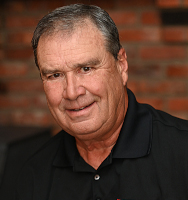
Just like Craig….Coldwater 11u pitcher Grant Winner fires a pitch during Friday’s action in the Craig Stammen Classic in Versailles. (Press Pros Feature Photos by Julie McMaken Wright and Sonny Fulks)
While you won’t see it in Versailles this weekend, amateur community baseball going forward faces challenges that current culture struggles to address. And who’da’ thunk it…about something that’s so simple and good?
 Verailles, OH – “Give us time, and three generations, and there’s nothing we can’t lose, even the best of things simple and good,” Mark Twain once said about the essence of being American.
Verailles, OH – “Give us time, and three generations, and there’s nothing we can’t lose, even the best of things simple and good,” Mark Twain once said about the essence of being American.
 Heavens knows what he would have said in this day!
Heavens knows what he would have said in this day!
But borrowing from his intellect and logic, and his gift for addressing the unspeakable, had he lived currently he would have had a field day.
Sadly, among the list of things simple, and good, is the future of amateur community baseball in America, once considered so inherent with a culture that embraced the sport and its icons that it came be called the national pastime.

One of several Norman Rockwell’s characterizations of baseball for the Saturday Evening Post.
There was a time when we revered baseball at every level. Grantland Rice wrote about it, saying, “Boys and baseball on the worst day imaginable inspires a good feeling, not unlike the warmth of the sun”.
Norman Rockwell painted it for the cover of the Saturday Evening Post, the country’s popular weekly chronicle of things good and virtuous…when good things stood out and virtue abounded.
When presidents made it a point of being seen at the ballpark on opening day, to throw out the first pitch as a symbol of stability and renewal. Hope springs eternal, even in politics.
But we no longer revere baseball at every level…not on a national basis…in part because our priorities have changed to appreciate things now from the top down, instead of from the bottom up. The simple pleasures of playing catch have lost out.
Out of this there are three critical issues that threaten the future of baseball as we know it – of kids being kids and dads teaching the proper grip for the fastball.
One…not enough dads. Once a foundation of culture, dads are increasingly absent from the theory of two-parent homes. There are two parents, of course, but they don’t live together. And along with sundry other responsibilities, times between dads and boys – when baseball is taught and shared – has lost out. It’s the simplest of building blocks once characterized by the Saturday Evening Post. But no more. Now we have MSNBC and Fox News. And baseball – playing catch – has been replaced by Play Station.

Centerfielder Will Huwer closes his eyes….and hopes. Making a catch during Friday’s play in Versailles.
Thankfully, this is not a local issue…not by any means. But it is a cultural one – a national one. And the reason we have a Stammen Classic this weekend…is because we have dads!
Two…not enough publicity. There was a time when baseball dominated radio, TV, and the daily news in America…what was called then, ‘The Golden Age’ of the game. Now, it’s denigrated as being slow, boring, and out of step with the cultural demand for thrills and fast pace. Football has become the national pastime, and even during its off-season football is so talked about, so publicized, that they scramble to find enough people to do the talking. A third of the reporters you see never played football! I think baseball realized this, but was slow to react with MLB.com. And by the time it did, the damage was done relative to its allure to young boys and girls.
Of course you wouldn’t have guessed this Friday evening as 13 and 14-year-olds from Marion Local and Versailles played. Slow, boring, and out of step was replaced by boys swinging for base hits, taking the extra base, and diving to score ahead of a tag at home plate. A 24-carat Play Station couldn’t have taken the place of Marion Local’s Jordan Langenkamp scoring in a cloud of dirt and drying agent (home page photo) in the fifth inning.

Phoenix Bats, Ohio’s bat company, proudly supports amateur baseball coverage on Press Pros Magazine.com.
Three…not enough baseball men – leadership – coaches, umpires, community people engaged across the landscape. When I was ten years old our Little League was run by men in the community who had played when they were young, themselves, and in their middle age were a driving force in the creation of facilities, recruiting coaches, umpires, and fund-raising for uniforms and equipment. Eddie Hardy, Bode Fleihmann, Vance Saunders, Vernon Dillon, and Ed Schafer. They got it, and made it a priority, in part, because those same men were satisfied by watching the next generation learn to play, knowing that they would someday pass the game on to the next generation.

Versailles 14-year-old Luke Borchers winces as he touches down while scoring in the Tigers’ 9-4 win over Marion Local.
In Versailles, Ohio today those men are Scott Ward, Chad Treon, Tyler Phlipot, Mike Brunswick and Jason Shardo…along with about twenty more who make sure the yearly turnout of participants is never less than 50 teams, that it’s coordinated, and that come Father’s Day weekend anticipation is high to play in ‘The Classic’.
And why is it so important?
I remember my Little League coach, Eddie Hardy, saying, “If you play high school baseball, then your son will play high school baseball, too.” Sustainability! Compare that to this day when more and more boys are dropping out of baseball because they can’t afford the cost of travel ball…or discouraged because there’s not enough men to coach and encourage the late-bloomers to keep playing. Or, there’s just other things to do.
Mind you now, none of this concerns me as I watch this weekend’s tournament; because Versailles, Minster, St. Henry, Coldwater, Fort Loramie, Russia, and other communities represented here are the exception, and not the rule.
But think of what the ‘rule’ used to be when baseball was acknowledged and embraced as something every little boy should aspire to be – when every toddler learned to take his first step while wearing a miniature baseball outfit.

Editor/publisher Sonny Fulks writes OHSAA sports and Ohio State baseball for Press Pros Magazine.
Think of it in terms of going to a major league ballpark back then hoping for a slow game, or extra innings, because you wanted to be around baseball as long as possible. Now, they want you out of the ballpark and home as quickly as possible so you can watch more TV.
Translation: Even baseball people don’t love baseball enough to want to prolong the experience. Just shorten it.
“Give us a few generations and there’s nothing we can’t lose, even the best of things simple and good.”
We’ve done it with just about everything you can think of in America, except in towns like the afore-mentioned. I beg you to prove me wrong, while you observe that baseball continues to flourish where there’s dads, leadership, and a culture of priority and virtue.
Where boys grow up playing high school baseball…and then teach their own boys to do the same!

Versailles pitcher Wyatt Mendenhall lets fly with a fastball during Friday’s 11u action at the Craig Stammen Classic.



